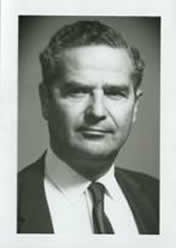

|

|
IN MEMORIAM
George W. Brown
Professor and Dean of the Graduate School of Administration
Irvine
1917–2005
Professor George W. Brown, the second dean of the then Graduate School of Administration (now The Paul Merage School of Business) passed away on June 20, 2005. He served as dean from 1967 until 1972. He retired in 1982 but remained active in campus affairs until his death.
George was born in Boston in 1917 and grew up in Boston where his father was a pharmacist. Having an exceptionally quick mind he achieved an enviable academic record at the Boston Latin School and at Harvard University, where he received a B.A. degree in mathematics at the age of twenty. Three years later he received a Ph.D. degree in mathematics at Princeton University. That prestigious degree did not bring him an academic position as he desired, doubtless because institutions of higher education were badly infected with anti-Semitism at that time.
His first job was with Macy’s Department Store in New York where he did statistical studies of the store’s operations. After four years he was back at Princeton University where he participated in military research projects being carried out by the University during World War II. After the war, he remained at Princeton because he was chosen by the eminent physicist, John von Neumann, to direct the construction of a revolutionary new computer that von Neumann had conceived.
Finally in 1946 George was able to begin his academic career at Iowa State University. He made up for lost time by starting out as an associate professor of mathematics; the following year he was promoted to professor. A year later a new nonprofit research organization, The RAND Corporation, recruited George because it needed the most powerful computer available. There, George directed the construction of a duplicate of the von Neumann computer and dubbed it the Johniac. As a member of the RAND Mathematics Department he participated in RAND’s major mathematical effort to apply mathematical game theory (a von Neumann invention) to military combat situations.
As a result of his familiarity with the von Neumann computer he enjoyed considerable status as a computer consultant at IBM and other computer manufacturers. In 1952 the IBM Corporation offered to give UCLA its most powerful computer if it would employ George to direct its computer laboratory. That arrangement brought George back to academia as professor of administration. He remained at UCLA until he was recruited by UCI to head the Graduate School of Administration. He spent his sabbatical year at Euratom, the European atomic energy research institute near Lake Magiorrre in Italy. Later he spent a half sabbatical in Israel at the University of Haiffa. His family much enjoyed these two international interludes.
During those fourteen years at UCLA, George played a significant role in the computer industry. Three times he helped groups of entrepreneurs organize and set up their manufacturing operations and served on their boards of directors.
George’s mathematical specialties were probability theory, mathematical statistics and mathematical logic. He published research in all three of those fields. His mental agility made him an especially valuable referee of manuscripts submitted to mathematics journals. The editors of those journals soon learned to rely upon him for prompt, accurate editorial reports.
George was an accomplished violinist and especially loved playing chamber music as a member of a string quartet. Throughout his life he quickly found or organized a string quartet wherever he lived so that he could enjoy a weekly session of chamber music. On one occasion, he found three-quarters of a string quartet that needed a viola player. He quickly learned to play the viola.
George met his first wife, Bobbie, at Macy’s Department Store where she was employed as a buyer. They had two children, Dana and Wendy. After a divorce he married Myra and adopted her three children, Lea, Michael and Jacob. He is survived by Myra and those five children and seven grandchildren.
Alex M. Mood
Professor Emeritus
Lyman Porter
Professor Emeritus